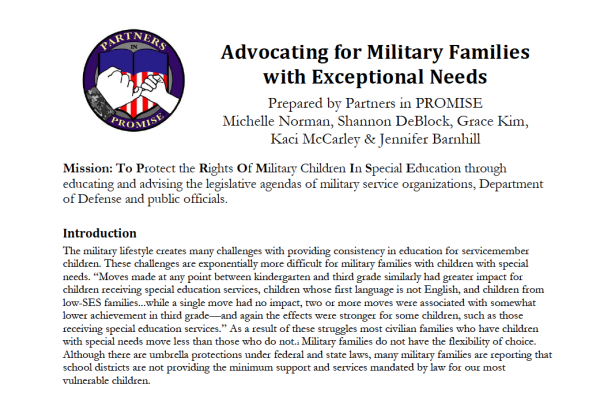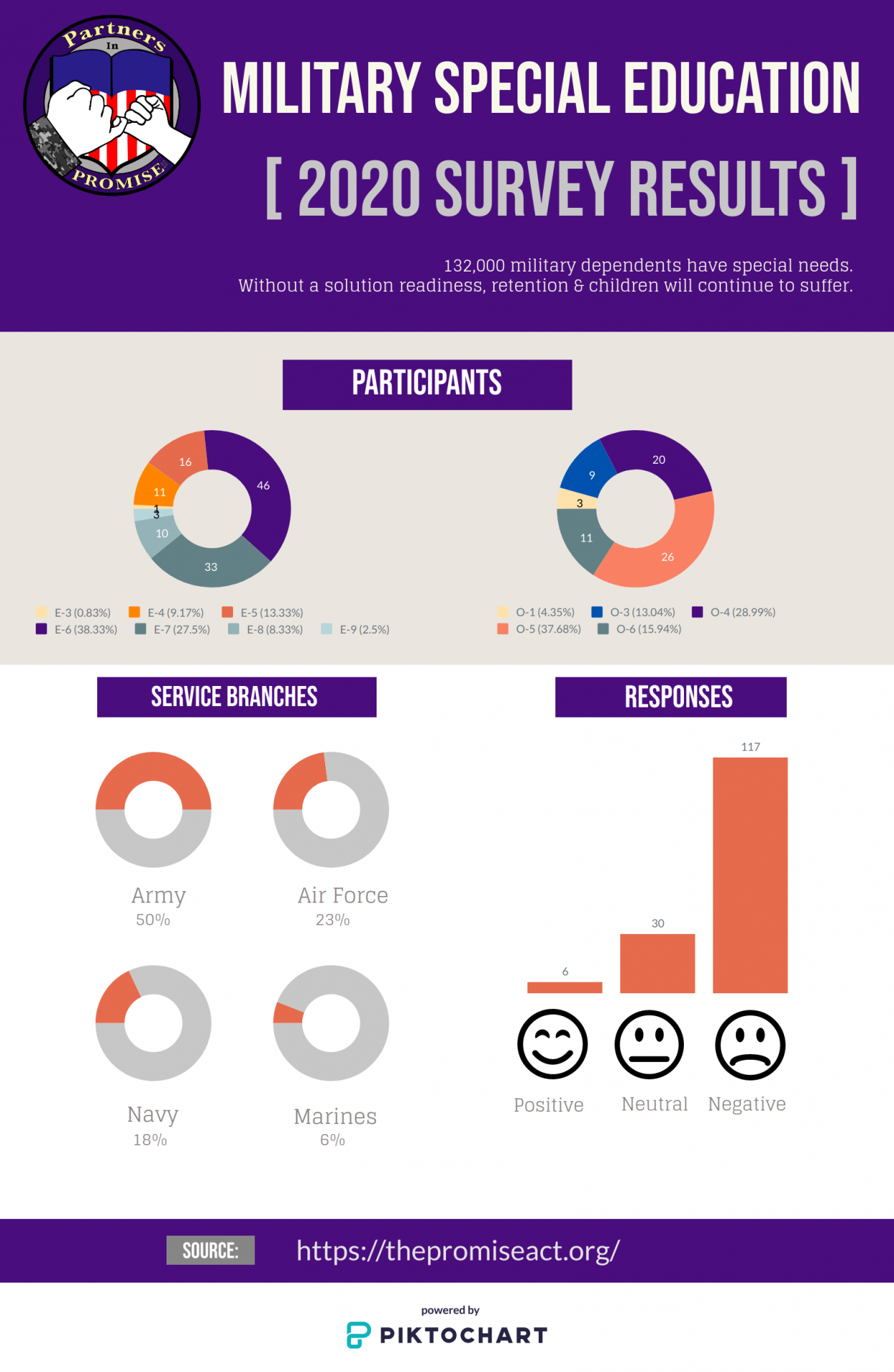
Partners in PROMISE White Paper
| Resources, Survey Data
Advocating for Military Families with Exceptional Needs
Prepared by Partners in PROMISE
Michelle Norman, Shannon DeBlock, Grace Kim, Kaci McCarley &
Jennifer Barnhill
Introduction
The military lifestyle creates many challenges with providing consistency in education for servicemember children. These challenges are exponentially more difficult for military families with children with special needs. “Moves made at any point between kindergarten and third grade similarly had greater impact for children receiving special education services, children whose first language is not English, and children from low-SES families…while a single move had no impact, two or more moves were associated with somewhat lower achievement in third grade—and again the effects were stronger for some children, such as those receiving special education services.” As a result of these struggles most civilian families who have children with special needs move less than those who do not.[i] Military families do not have the flexibility of choice. Although there are umbrella protections under federal and state laws, many military families are reporting that school districts are not providing the minimum support and services mandated by law for our most vulnerable children.
Military Readiness Impacted
It is widely recognized that frequent moves have a significant impact on the continuity of education for military children. Military parents report that their children experience behavioral issues and require extra help to catch up.[ii] Children with exceptional needs require specialized educational services, but when services are disrupted, the required parental advocacy increases. The result is a less ready force. “Advocacy enhances coping, advocacy involves struggle, and advocacy causes stress.”[iii] And as we know increased stress impacts operational readiness. According to an Armed forces and society study, male military members’ work performance declined by 19 percent when under significant family-related stressors.[iv] Anecdotal reports indicate some families choose to be geographically separated from the servicemember because of special education-related concerns. While this may relieve academic stress placed upon families it contributes to the stress faced by military spouses living as solo caregivers during these geographic separations..
Special Education Is Universally Complex
The average military child may move to a new location, face education gaps and deal with parent’s deployments. These “normal” military educational concerns are met with increased parent and teacher sensitivity training and customized resources. However, the issues faced by special needs families are not as straightforward.
Although there are only roughly 130,000[v] families who participate in the Exceptional Family Member Program (EFMP), one in five children in the United States face learning and attention issues like dyslexia and ADHD. To further compound the struggles faced by these children, 48 percent of parents incorrectly assume that they will outgrow “brain-based” struggles, leaving many children undiagnosed or untreated.[vi]
A child’s Individualized Education Program (IEP), created to allow access to a Free Appropriate Public Education (FAPE), can vary drastically from one student to another. The student’s challenges could be as simple as having an IEP for executive functioning goals. Other challenges could be life-threatening such as ensuring trained nursing services are available to handle a trach tube change or providing a one-on-one aide to ensure the safety of a non-verbal child on the autism spectrum. A student’s IEP is the foundation for their education and is based on their individual needs, regardless of a child’s gender, race, family income or school district. Special education is inherently complicated, because it is customized to fit the unique needs of each student. There is not one cookie cutter education plan and therefore special education problems feel “messy.”
Special Education Families Are Invisible
“There may be a large and rising number of families that are invisible
because they are neither tabulated nor targeted in family readiness efforts.”[vii]
For over a decade, EFMP families have been frustrated over the lack of oversight on special education for their children.[viii] Although EFMP was introduced by the Army in 1979[ix], military families with special needs have been underrepresented in military surveying. The last survey to examine EFMP effectiveness was conducted by GAO in 2012. Based on the information collected we know that:
- The Exceptional Family Member Program is not standardized by location or service branch.
- There is little, to no program oversight or accountability by DoD’s Office of Special Needs.
- There is little data collected on the program.
These facts have not changed over the past eight years as evident by the evidence presented in a 2018 GAO study[x]. Despite federal and state education regulations in place to protect students with special needs, children are caught in a system that operates with impunity because there is no accountability. Although the Department of Education serves as the regulatory agency for all public-school systems, they have no effective way to enforce their legal decisions. As most schools are responsible for defining, rating and reviewing their own performance metrics and in many cases, determine which directives they will or will not follow. Some are responsible and provide education to the minimum standards of federal law. Unfortunately, many schools have realized that it is easier to follow the path of least resistance, by prioritizing competing agendas. In the process, laws are broken, leaving vulnerable children with a substandard education.
A Grassroots Movement
As a result of a lack of information and support, four military spouses formed Partners in PROMISE in January 2020. Together we began to examine the challenges that military children with disabilities are experiencing in their struggle to receive a free and appropriate public education. These individual advocacy efforts culminated in creation of the Military Special Education 2020 Survey (Exhibit 1). This grassroots survey confirmed our individual suspicions, that the EFMP program was riddled with systemic problems. Over a short period of time, over 200 families from across all service branches responded. The survey asked participants to “share your experience with special education.” Qualitative results included parents comparing positive and negative school experiences. And both qualitative and quantitative responses were overwhelmingly negative. Only three percent related positive experiences. The remaining 97 percent of families related some or all negative experiences. Narrative responses varied in length from one sentence to several pages. The words parents used to describe their experiences with public school special education included:

These preliminary survey results confirm that special education is an unspoken challenge for military families at duty stations around the world. Parents reported special education issues in schools spanning 39 states, Washington D.C., Guam and many DODEA schools. Respondents comprised a representative sampling of all service branches. Respondent ranks ranged from E3 to O6 with the largest amount of feedback from E-6s and E-7s. Qualitative responses indicated that these pay-grades did not feel that it was financially possible for them to hire an advocate or attorney to ensure a child is receiving appropriate special education. Surprisingly, areas that have been designated as approved locations for military students with IEPs were the locations with the highest number of negative experiences. Unsurprisingly, the longer families serve in the military and the more moves they experienced, the more frequently they reported significant challenges in ensuring their child receives FAPE, the legally mandated minimums for special education in public schools in the Individuals with Disabilities Education Act (IDEA).
Unconfirmed Suspicions – EFMP Pain Points
While there are some parents who report that school districts are working diligently to meet the needs of military children who require special education, we are concerned with the overall number of military families reporting significant challenges in receiving FAPE. These struggles, in addition to being captured in our Milsped 2020 survey, are documented when military families file formal disputes against school districts through state complaints, mediations and due process cases. However, we suspect that countless military families have faced financial obstacles, a gap in legal information, as well as fear of reprisal for entering disputes. These factors result in schools “waiting families out” until they move to their next duty station. Of the several public-school districts that have been found guilty of not providing FAPE for military families, it is unclear what further remediation has been conducted to ensure they comply with the law going forward.
Additionally, consistent underfunding of IDEA and Impact Aid may be contributing to systematic struggles to fully fund educational resources for special needs students nationwide.[xi] Many of these issues might be mitigated with full funding of these important educational programs.
While the Department of Education collects data on the number of special education disputes filed annually, they do not collect data on the number of disputes entered by military families, nor do they track their outcomes. Therefore, it is unknown whether military families experience a higher rate of disputes and failure to provide FAPE. This data is critical to informing DoE and DoD policies and programs that support military children with special needs.
These sentiments were echoed during a House Armed Services committee hearing held on February 5, 2020. Partners in PROMISE Executive Director and cofounder Michelle Norman submitted written testimony that included over 100 family testimonies that relayed their struggles with EFMP and special education.
Legislative Solutions
At the request of the Military Family Caucus, co-chaired by Congresswoman Cathy McMorris Rodgers (R-WA) and Congressman Sanford Bishop (D-GA), and in response to the survey responses gathered by the Milsped 2020 survey, Partners in PROMISE created The PROMISE Act. The PROMISE Act, Protect the Rights Of Military Children In Special Education, has proposed the following action items to correct the systemic issues with the Exceptional Family Member Program and military special education.
- Directing a Government Accountability Office (GAO) study that identifies school district usage of 7003(d) impact aid funds
- Ensuring remote school enrollment for all military families
- Tasking DoD to provide annual report to Congress on special education challenges facing military children
- Allowing families to maintain IEPs at the gaining duty station after a PCS for up to 6 months
- Requiring parental consent to all IEP changes before changes can be implemented
- Providing special education attorneys and advocates across all service branches in densely populated EFMP locations
- Instructing State Education Agencies and the U.S. Department of Education to gather and provide data on special education disputes involving military children
In April 2020 Rep. Mac Thornberry (R-TX), ranking member of the House Armed Services Committee, and Rep. Trent Kelly (R-MS), ranking member of the Subcommittee on Military Personnel, introduced H.R. 6489, Military Family Readiness legislation, for inclusion in the FY21 National Defense Authorization Act. Highlights include the provisions of a GAO study and EFMP attorneys to be provided to military families at select locations. These are wonderful first steps for military families, but these steps must be coupled with action in order to improve the military special education experience.
Conclusion
These educational deficiencies, compounded with each permanent change of station move, leads to an education that falls well below the legal standards. The lost instruction and insurmountable challenges for parents create undue burdens and stress on military families and their children with special needs, significantly putting at risk military retention and impacting readiness. The solution is clear. We need to support our military families by demanding increased accountability and information.
Exhibit 1

[i] “Ch. 2 Which Children Are Most Affected by Mobility?.” National Research Council and Institute of Medicine. 2010. Student Mobility: Exploring the Impacts of Frequent Moves on Achievement: Summary of a Workshop. Washington, DC: The National Academies Press. doi: 10.17226/12853.
[ii] Shafer, Leah, Bari Walsh and Matt Weber. 2016. “For Military Kids, Resilience and Challenges.” Harvard Graduate School of Education. November 9. https://www.gse.harvard.edu/news/uk/16/11/military-kids-resilience-and-challenges (November 9, 2016)
[iii] Wang, M., Mannan, H., Poston, D., Turnbull, A. P., & Summers, J. A. 2004. Parents’ Perceptions of Advocacy Activities and Their Impact on Family Quality of Life. Research and Practice for Persons with Severe Disabilities, 29(2), 144–155. https://doi.org/10.2511/rpsd.29.2.144
[iv] Bray, R. M., Camlin, C. S., Fairbank, J. A., Dunteman, G. H., & Wheeless, S. C. (2001). The Effects of Stress on Job Functioning of Military Men and Women. Armed forces and society, 27(3), 397–417. https://doi.org/10.1177/0095327X0102700304
[v] Congressional Research Service. 2020. “Defense Primer: Exceptional Family Member Program (EFMP).” In Focus. January 29. https://fas.org/sgp/crs/natsec/IF11049.pdf (January 29, 2020)
[vi] Horowitz, S. H., Rawe, J., & Whittaker, M. C.. 2017. “The State of Learning Disabilities: Understanding the 1 in 5.” New York: National Center for Learning Disabilities.
[vii] Hawkins SA, Condon A, Hawkins JN, Liu K, Melendrez Ramirez Y, Nihill MM, Tolins J. 2018. “What We Know About Military Family Readiness: Evidence from 2007-2017.” Research Facilitation Laboratory. Monterey, CA: Office of the Deputy Under Secretary of the Army; 2018. https://apps.dtic.mil/dtic/tr/fulltext/u2/1050341.pdf (March 30, 2018).
[viii] Bronfenbrenner Center for Translational Research, Cornell University and Beach Center on Disability, The University of Kansas. 2013. “Department of Defense Exceptional Family Member Program Benchmark Study.” September 2013. https://download.militaryonesource.mil/12038/MOS/ResourceGuides/EFMP-Benchmark.pdf
[ix] Congressional Research Service. 2020. “Defense Primer: Exceptional Family Member Program (EFMP).” In Focus. January 29. https://fas.org/sgp/crs/natsec/IF11049.pdf (January 29, 2020)
[x] MILITARY PERSONNEL – DOD Should Improve Its Oversight of the Exceptional Family Member Program.” U.S. Government Accountability Office (GAO). May 2018. GAO-18-348. https://www.gao.gov/assets/700/691647.pdf
[xi] IDEA Series: Broken Promises: The Underfunding of IDEA.” National Council on Disability. 2018. https://ncd.gov/sites/default/files/NCD_BrokenPromises_508.pdf (February 7, 2018).



